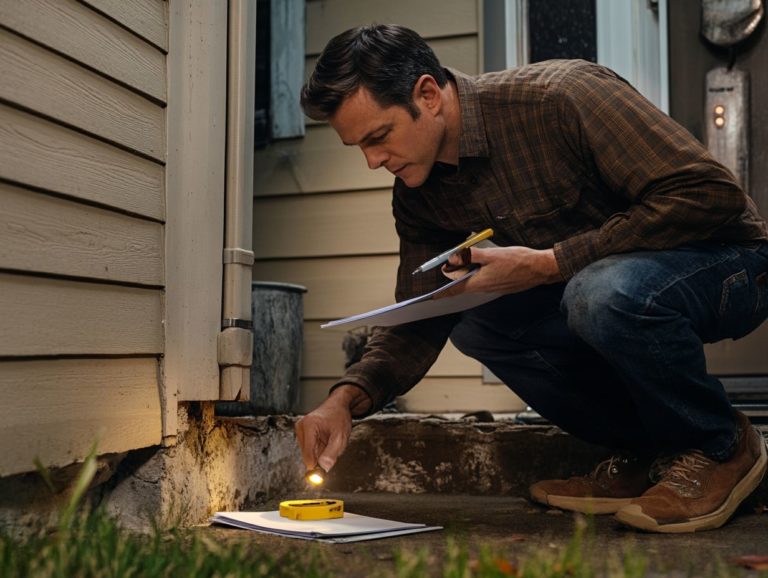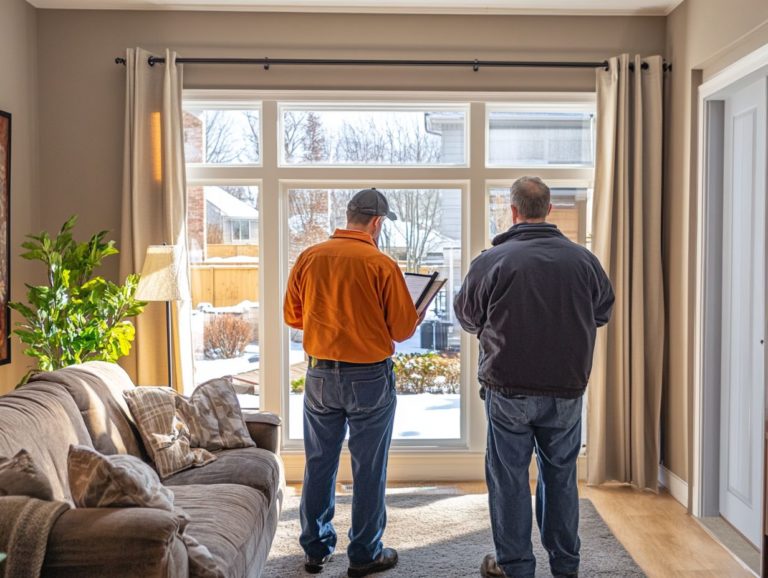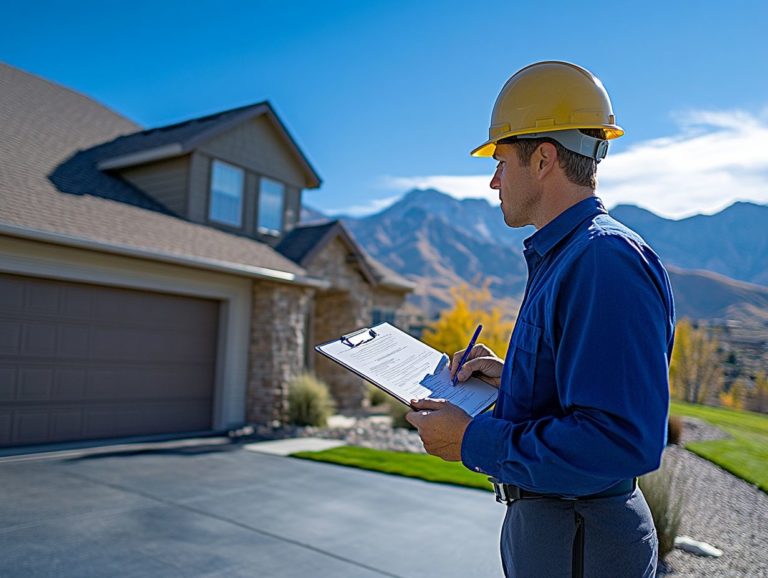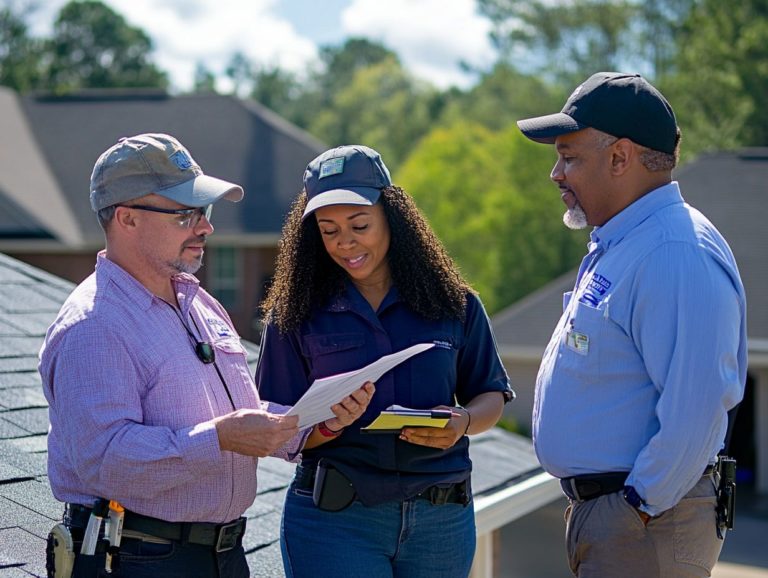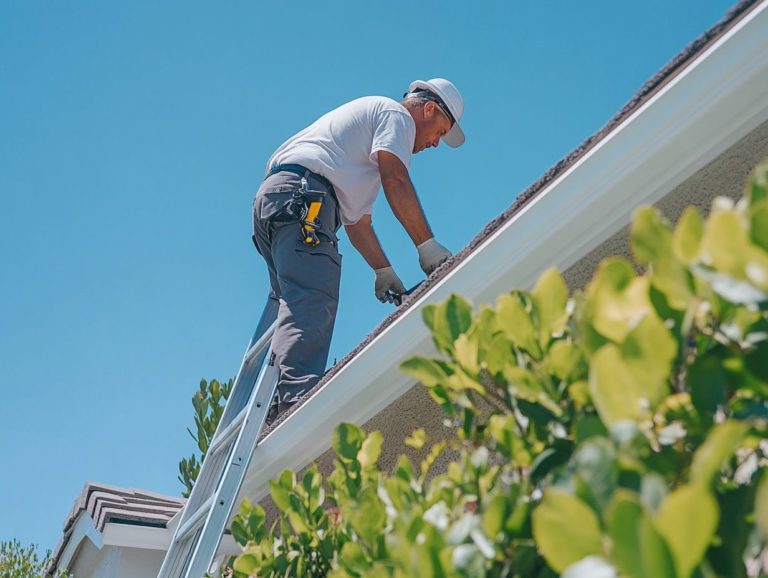Understanding Home Inspection Licensing Requirements
Home inspections are an important part of your home buying journey, giving you peace of mind that can save you from future headaches by uncovering the true condition of a property.
It’s essential to recognize that not all inspectors offer the same level of expertise; this is where licensing becomes pivotal. This article delves into what home inspection involves, the significance of regulatory standards, and the specific licensing requirements for inspectors in various states.
Explore the advantages of hiring a licensed home inspector to ensure you’re making a well-informed investment. Your dream home is almost yours! Let s uncover the key insights you need to make this critical process a breeze.
Contents
- Key Takeaways:
- What is Home Inspection?
- Why is Licensing Required?
- Licensing Requirements for Home Inspectors
- State-Specific Licensing Requirements
- Benefits of Hiring a Licensed Home Inspector
- Frequently Asked Questions
- What are home inspection licensing requirements?
- Do all states have the same home inspection licensing requirements?
- What type of education is required for home inspection licensing?
- Do I need to pass an exam to become a licensed home inspector?
- Are there any additional requirements for home inspection licensing?
- Can I transfer my home inspection license to another state?
Key Takeaways:

Home inspection is a thorough evaluation of a property’s condition and functionality, conducted by a licensed professional. Licensing is necessary to regulate the home inspection industry and ensure quality standards are met for consumer protection. Requirements for home inspector licensing vary by state but typically involve education, training, exams, and certifications.
What is Home Inspection?
Home inspection plays an important role in real estate transactions, allowing you to gain deeper insights into a property’s condition through the expertise of a qualified home inspector.
This extensive evaluation covers crucial elements, including structural integrity, electrical systems, plumbing, and general safety concerns, enabling you to make informed decisions.
In Maryland, if you’re considering becoming a licensed home inspector, you’ll need to understand the educational requirements, complete a training course, and successfully pass the National Home Inspector Exam.
This rigorous process ensures that you uphold high standards of professionalism and expertise in the field, ultimately benefiting both you and your clients.
Definition and Purpose
The concept of home inspection centers on evaluating the condition of residential properties, equipping you, the potential buyer, with essential insights into your prospective investment.
This process is vital for uncovering defects and safety hazards that may remain hidden during a casual walkthrough, allowing you to make informed decisions.
By conducting a meticulous property evaluation, home inspections promote transparency in real estate transactions, ensuring you fully understand what you are truly investing in.
In Maryland, where real estate markets can fluctuate dramatically, a thorough inspection could be the key differentiator between a savvy purchase and an unexpected financial headache.
Ultimately, this practice safeguards both you and the seller by fostering trust and accountability throughout the transaction process.
Why is Licensing Required?
Licensing is crucial for home inspectors, as it establishes your credibility and ensures that you meet the standards and regulations set by the Maryland Department of Labor.
Without proper licensing, you expose yourself and your clients to significant risks, including legal liabilities and subpar inspection services.
As a licensed home inspector, you are accountable for your professional responsibilities and ethical practices, which not only safeguards consumers but also enhances the overall reputation of the industry.
Importance of Regulation and Standards
Regulation and standards are crucial in the home inspection industry, ensuring that you, as a home inspector, maintain a consistent level of quality and professionalism.
This is especially true in Maryland, where rigorous regulations such as the National Home Inspector Exam set a high bar for competency and ethical practices.
By requiring inspectors to pass standardized tests, this framework not only validates your skills but also builds trust with potential homebuyers.
Such oversight is essential for maintaining the integrity of the inspection process, as it protects consumers from subpar assessments that could lead to costly errors.
Ultimately, your commitment to high standards fosters a professional environment that benefits both you as an inspector and the homeowners you serve.
So, get ready to dive into the home inspection process and secure your investment with confidence!
Licensing Requirements for Home Inspectors

The licensing requirements for home inspectors in Maryland involve a detailed application process that demands specific education and training.
This ensures that only the most qualified professionals are authorized to conduct home inspections, safeguarding the integrity of the industry and the interests of homeowners.
Education and Training
To become a licensed home inspector in Maryland, you must meet specific education requirements, which typically include completing a Commission-approved training course.
Along with this foundational course, you can explore various educational paths. Hands-on training lets you experience property inspections directly, while online training provides flexibility to fit your studies into a busy schedule, allowing you to learn at your own pace.
It’s crucial for home inspectors like you to engage in continuous education to stay updated with industry standards and regulatory changes. Staying updated helps you provide skilled and trustworthy services.
Maryland also offers specialized workshops and seminars, enriching the learning experience for home inspectors at every level.
Exams and Certifications
Exams and certifications play a pivotal role in the home inspector licensing process, ensuring you possess the essential knowledge and skills required to conduct thorough inspections.
In Maryland, these assessments not only validate your expertise but also foster trust between you and homeowners. The National Home Inspector Exam tests your knowledge of home inspection practices and features a comprehensive evaluation that covers vital topics such as:
- Electrical systems
- Plumbing
- Roofing
- Structural components
This guarantees that you are well-equipped to identify potential issues and safety hazards. Obtaining these qualifications is often a prerequisite for licensure in the state, showcasing your commitment to upholding high industry standards and promoting public safety in real estate transactions.
State-Specific Licensing Requirements
State-specific licensing requirements for home inspectors differ markedly across the United States.
Maryland and the District of Columbia have different regulations to protect homeowners and improve industry professionalism.
Overview of Different State Regulations
An overview of different state regulations reveals a diverse landscape of requirements that you must navigate to achieve licensure and certification as a home inspector, including understanding home inspection standards.
In this context, examining how Maryland’s comprehensive certification processes compare to those of neighboring states provides valuable insights into the broader regulatory framework.
For instance, Maryland mandates specific educational prerequisites and ongoing education, while Virginia adopts a more practical experience-oriented approach, lacking extensive formal training.
Meanwhile, Pennsylvania strikes a balance with a combination of both, reflecting a hybrid model.
By understanding these distinctions, you can better prepare for the challenges posed by varying state regulations, ultimately enhancing your qualifications and marketability in an increasingly competitive field.
Benefits of Hiring a Licensed Home Inspector

When you hire a licensed home inspector, you unlock benefits that go beyond convenience. Their expertise is essential for making smart property investment decisions.
This assurance of quality and professionalism they provide is crucial for safeguarding your interests and enhancing your confidence in the choices you make.
Ensuring Quality and Professionalism
One of the primary advantages of hiring a licensed home inspector is the assurance of quality and professionalism in the inspection services you receive. This assurance stems from the detailed training and strict certification these professionals undergo. They are equipped with the essential knowledge and skills to identify potential issues within a property.
When you seek home inspection services, you can trust that certified inspectors adhere to industry standards and best practices. This directly enhances the reliability of the assessment. Their extensive expertise ensures that every corner of your home is thoroughly examined, reducing the risk of future complications and fostering confidence for both buyers and sellers.
This commitment to professionalism enhances your home inspection experience.
Legal Protection for Home Buyers
Legal protection for home buyers is a vital advantage of hiring a licensed home inspector. Their errors and omissions insurance acts as an added layer of security that you can depend on.
This type of insurance provides financial coverage if a mistake occurs during the inspection and reinforces the inspector’s accountability to uphold professional standards. When you choose licensed inspectors, you can feel confident knowing that if an oversight happens like missing significant structural issues you may receive compensation for any resulting damages.
Such liability coverage motivates inspectors to perform thorough and meticulous evaluations, fully aware they are supported by a solid safety net. This legal protection boosts your confidence, making your home-buying journey smoother and more secure!
Frequently Asked Questions
What are home inspection licensing requirements?
Home inspection licensing requirements refer to the set of regulations and criteria that must be met to become a licensed home inspector. To ensure you’re working with qualified professionals, it’s important to know understanding home inspector qualifications, which vary by state and typically include education, training, exams, and background checks.
Do all states have the same home inspection licensing requirements?
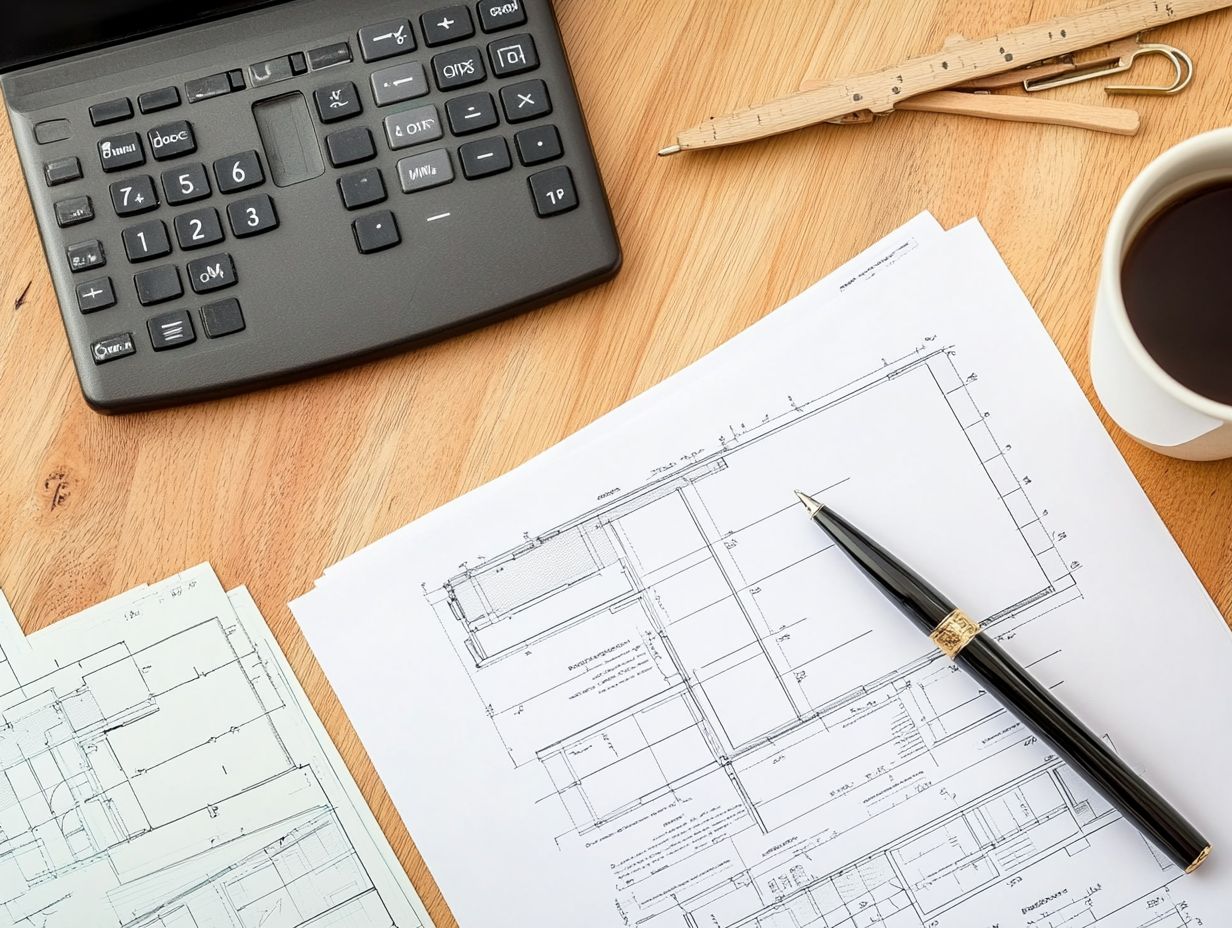
No, home inspection licensing requirements vary by state and can even differ within states. It is important to research and understand the specific requirements for the state in which you wish to become a licensed home inspector.
What type of education is required for home inspection licensing?
The type of education required for home inspection licensing can vary but typically includes a certain number of hours of classroom training and/or online courses. Some states may also require specific courses on topics such as building codes or ethics.
Do I need to pass an exam to become a licensed home inspector?
Yes, most states require home inspectors to pass an exam to obtain a license. The exam may cover topics such as building materials, systems and components, and inspection methods.
Are there any additional requirements for home inspection licensing?
In addition to education and exams, some states may also require home inspectors to have a certain number of supervised inspections or apprenticeship hours before obtaining a license. It is important to research the specific requirements for your state.
Can I transfer my home inspection license to another state?
In most cases, home inspection licenses are not transferable between states. Each state has its own requirements and processes for licensing, so it is important to understand the requirements for the state in which you wish to practice as a home inspector.

